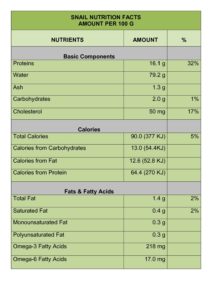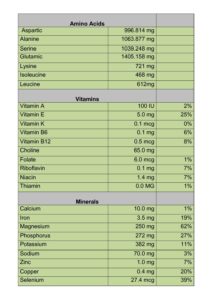High in Protein and Omega-3 and boasting more Iron than red meat … no wonder our snails are being touted as the new Superfood!
Snails contain a whole host of vitamins and amino acids and are very high in calcium, magnesium, phosphorus, sodium, and essential fatty acids.
But don’t just take our word for it … we have compiled a list of fascinating articles highlighting the many health benefits of eating snails.
Eat me: Six reasons snail is good for you
Snails also boast many health benefits from good heart health to cancer-fighting properties. – Find out more here
Snail health benefits and nutrition
Protein, iron, magnesium, calcium … you name it, snails have it! – Find out more here
The latest Superfood – why you should be eating snails
If you’re one of the many diners who baulk at the idea of downing a plate of garden pests, think again, for snails have come out of their shells and are basking in the glory of being the new star superfood. – Find out more here
Snails for western health care from antiquity to the present
Snails have a history of health and therapeutic benefits. This article looks back at their rich medicinal background. – Find out more here
If you cringe at the thought of snacking on snails, call them by their French name – escargots – and bask in their nourishment!
This article looks at the many health, vitamin and mineral benefits. – Find out more here
Snails are well-known for their lack of speed, but there is growing scientific interest in the familiar sticky trail of slime they leave behind — and the medicinal value it may contain.
Both the ancient Greeks and Romans advocated eating snails to cure a wide variety of ailments. These included fainting, stomach pains, and coughing up blood, as well as general pain relief. – Find out more here.
HEALTH BENEFITS
Protein: Snails have a high protein content, ranging from 10 to 16% of the fresh weight.
Iron: Snails are also a good source of iron; they even have more iron than red meat. Iron is essential for building red blood cells and carrying energy around the body. A lack of iron can lead to extreme fatigue and anaemia. The iron in snails is in the heme form, which is easier for your body to absorb than iron from plant-based sources.
Amino Acids: Snails are a good source of amino acids, fatty acids, vitamins and minerals. Snails contain the following amino acids; Aspartic, Alanine, Serine, Glutamic, Lysine, Isoleucine and Leucine.
Omega-3: The fat within snails is most beneficial, providing the body with Omega 3 fatty acids, which are considered essential as they inhibit atherosclerosis and thrombosis and have anti-inflammatory effects to help prevent allergies, depression and other diseases of the nervous system.
Selenium: Although we don’t need much in our bodies, we do need some to keep a healthy immune system and protect cells against damage.
Lectin: Snails are a great source of lectin, possessing anti-cancer properties to help boost the immune system to fight against cancerous cells.
Calories: Snail meat carries just 60-90 calories per 100 g – far less than fish, bi
Fat: The percentage of fat is 0.5 to 2%.
Water content: The water content ranges from 73-89%.
Magnesium: Snails are a good source of magnesium, which our bodies need to maintain a normal blood pressure, strengthen bones and keep your heartbeat regular.
Salt Content: Snails are low in salt
Vitamins, Minerals & Metals: Snails are a rich source of vitamins, minerals and metals, especially iron (even more than red meat), potassium and magnesium.
Vitamin B12: Often cited as the ‘energy vitamin’, B12 is needed for making red blood cells, keeping the nervous system healthy, releasing energy from the food we eat and processing folic acid.
Vitamin E: Vitamin E is a fat-soluble vitamin, which plays a role as an antioxidant in the body. It also helps to prevent free radical damage to specific fats in the body that are critical for your health. Vitamin E is an important vitamin that is required for the proper function of many organs in the body and is extremely useful in naturally slowing aging. Vitamin E benefits include treating and preventing diseases of the heart and blood vessels; such as chest pains, high blood pressure, and blocked or hardened arteries.
Vitamin A: Vitamin A is essential for normal vision, bone growth, healthy skin and protection of the mucous membranes of the digestive, respiratory and urinary tracts.



